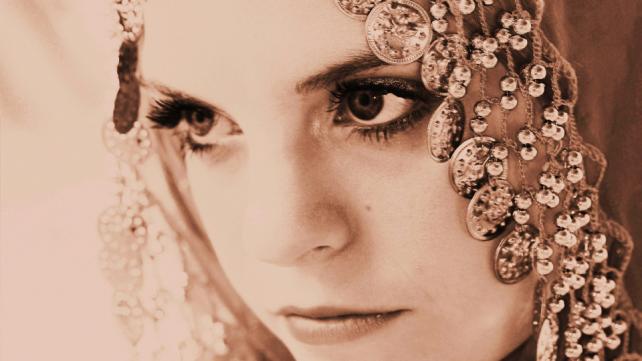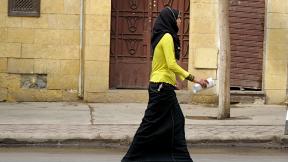
The discussion at the Islam Awareness Week exhibition started out nicely enough. We talked about women's rights, domestic violence, sexual abuse, heavy, heavy issues. It was interesting, she was a feminist, and I, a Muslim woman. But we connected.
Then, as always, the topic turned to Hijab. She started out politely enough, complimenting me on mine and the way I wore it. She asked why I wore it. Faith and personal choice, I replied, the words practically a mantra now after speaking to several women about it in the past. But I began to feel that familiar knot in my stomach. I knew what the next question would be.
“As a feminist, I support your right to wear Hijab because it's a choice. But if you really believe in choice, don't you support the right of women NOT to wear Hijab in Iran, Afghanistan and Saudi Arabia, where Hijab is forced on women?”
I gulped. What could I say? I looked at my feet, and then looked up. She had me cornered.
******
“I just find it incredibly difficult to negotiate this question,” says Kathy Bullock, a Hijabi who completed a PhD. thesis on The Politics of the Veil from the University of Toronto's Political Science Department in January.
Muslims and Liberals, especially those who are feminists, occasionally butt heads over this issue.
For liberals, Bullock explains, their views on Hijab are clear. “For them, even the mere fact that it's a thorny question for us it's a problem because for them the issue is clear: the individual has the right to dress as they choose.”
She notes that Muslims, on the other hand, do favor kind of state enforcement of Shariah, and by extension, Hijab.
The three countries most usually cited for Hijab enforcement are Afghanistan, Iran and Saudi Arabia.
Hijab, more specifically the Burqa, has been enforced in Afghanistan since the Taliban took over major parts of the country in 1996 following years of civil war. The Burqa covers the entire body, head and face.
In Iran, Bullock says Hijab has been enforced since 1981, two years after the Islamic Revolution took over the country's leadership, with the support of most Iranians.
In Saudi Arabia, Bullock says she knows of no exact law making Hijab mandatory in the state, but it seems custom, social and family pressure play a role in ensuring Hijab, as well as the Niqab or face covering, is worn.
In all three cases, some form of violence has been associated with not complying to Hijab in these countries, including beating and whipping.
The perception of many liberals is that Islam is violent, misogynist, and anti-personal choice, with an Islamic state ideally interfering in every aspect of its citizens' lives.
A RESPONSE TO THE QUESTION-SOME POINTS
Jamal Badawi is part of the North American Fiqh Council. He notes that there is no precedent in Islamic teaching for state enforcement of HIjab. However, there is evidence of positive pressure and encouragement to wearing Islamic dress.
Badawi offers a few ways the “liberal” question can be answered:
1. We do not support what contradicts Islam
This point has to be mentioned at the outset, in order to set the guidelines for the response to this question.
“One cannot say I support the ‘right' to disregard the teaching of Islam,” says Badawi in an interview with Sound Vision from his home in Halifax, Nova Scotia. “That's the trick in this question.”
This is also important to remember because liberals do not view not wearing Hijab as a wrong.
2. We support the right method, though
“What one can say safely is that we support the Prophetic approach in bringing about change as it was done in the matter of Hijab without resort to compulsion or force,” explains Badawi.”
Bullock agrees that it's important to separate the obligation of Hijab from the violence that is often associated with its enforcement in some Muslim societies. She notes a Muslim should condemn violence, for example, but that it can be separated from the issue of Hijab enforcement by the state.
3. No society has absolute freedom
In response to the enforcement of Hijab in some Muslim countries, Badawi says:
”When we say choice, there is no even liberal democracy in our century that allows free choice in the absolute sense. For instance, even in the Western world if a woman or man wants to make a ‘choice' of walking naked in a public place, we know that this is not regarded as an acceptable ‘choice'.”
“That shows that societies have the right to set reasonable limits on choices so as not to harm society at large or its ‘moral values'. It is in the same vain that it would not be inappropriate for an Islamic state to set those reasonable limits.”
Bullock suggests making parallels between dress cods in Muslim countries and Western countries. For instance, in most of the West, women cannot go topless on the streets (although it is legal in the Canadian province of Ontario).
4. In an Islamic state there should be choice in the type of Hijab
Badawi points out that Muslim states should allow for differences in interpretation of the Hijab, most notably, whether the face of a Muslim woman can remain uncovered or not.
“I must say that the reasonableness of those limits [on dress] should imply that no one particular interpretation should be forced on all so long as there is another legitimate interpretation,” he says.
“If there are these two Fiqh positions, nobody has the right to enforce stricter limits if there is another legitimate interpretation which excludes the covering of the face.”
5. No vigilante groups to enforce Hijab
“It must be emphasized that the concept of vigilante is unacceptable in certain kinds of enforcement of the law,” says Badawi. “So long as there is a state in place, an Islamic state, it would be the duty of the state to enforce it on other levels.”
“It is not the right of individuals or groups to enforce criminal law, for example, otherwise it would be a total chaos, because these are matters that require due process of law in front of competent judges.”
“One cannot refer to the broad Quranic injunction to enjoin the good and forbid the evil to justify enforcement of criminal law. Organizations however, may within the boundaries of the law advise and encourage the enjoining the good and forbidding the evil just as individuals do.”
6. Hijab: Get over it
The “over obsession” with Hijab also needs to be addressed when such a question is brought up, says Badawi.
“Given the nature of what's happening in Muslim societies today there are lots of other wrongs on a more basic level that need to be corrected,” he notes.
“Like the issue of Iman [Faith] and only after that is attained, detailed issues like this [Hijab] would fall in place without much pressure.”
Photo Attribution: http://upload.wikimedia.org/wikipedia/commons/b/b6/Bejeweled_Girl_Portrait.jpg








Comments
hijab
First off , let me say that I am a non-believer. I say that because I want you to know that "I am on the outside looking in". Personnally. because of my belief, I look at the whole issue as another one of those things that humans spend too much time thinking about. Even to have to comment on this article to me is almost insulting. My concern is that this attire has caused so much discord. I am mostly speaking about the people in western nations who act as if we should go to war behind the fact that in some nations it is the law that women dress in that attire. Really? Look, I'm a westerner and there is a whole bunch of stuff that I wouldn't want to abide by if I lived in certain countries. I'm sorry but if this is the major issue that these women are facing then they should count themselves lucky. The last time I looked, the middle east was on fire. I would want to figure out how to stop all the bombs from dropping. Also, I want to say that many of the people over here in the west who are protesting this dress code are not actually concerned about the rights of these women. If the were concerned then why would they take away the rights of women who choose to dress in that manner by banning the hijab. No, what I believe is that many of those people are just using the issue to point out another reason why people should hate Muslims. People in the west are experts at hiding a bad motive behind a good one. Think about it. Here we are pretended like we are concerned about those women when we have been dropping bombs on them since the late eighties. I'm sure many of those women we killed wish they could be alive right now and wearing a hijab. And lastly, we in the west really need to concern are selves with the real problems we have in our own countries. It's amazing how everybody gets all worked up about the harm these women do to our cultures when it is our own country men who are more likely to kill us. I wish there were more Muslims here than less. Every Muslim I have met has been kind, generous, smart and, helpful. That is the truth.
Location
Hijaab and /Niqaab
Wow ! I find all this question on whether or not one should enforce the laws of the Master of the worlds so disappointing. Allaah Subhana-wa - Ta'Aala is very clear in the Quraan when he tells believing women to cover themselves . I challenge you all as believing women to go find Allaah's commandment and understand that he is very succinct. As Islamic states it will only be normal that they enforce the Law of Allaah as this is what governs them. Problem is ,we are influenced by western ideologies and forget who we are as Muslims. We also use the verse with regards to no compulsion in the wrong context .... no compulsion is meant for the non-believer and does not refer to the believer....
So yes we all do have choices However the choice is whether i do what is right or wrong and whether it pleases Allaah or not ...so sisters in Islam these are the questions you need to be asking ....
Who Am I? What are my beliefs ? and what does Allaah expect of me.... ultimately he is the only judge and we must do what pleases him ....so if sisters all over the world have chosen to wear the hijaab/ niqaab then it should be done for the pleasure of Allaah.
May Allaah guide us all Insha'Allaah...
Location
Hijab
You are so very wrong.
"Allaah Subhana-wa - Ta'Aala is very clear in the Quraan when he tells believing women to cover themselves . I challenge you all as believing women to go find Allaah's commandment and understand that he is very succinct. "
I have read the English translation. And I have also challenged several muslims to testify where it says women must use clothes like Hijab, Niqab and Burka. They DONT exist. It is spoken about a veil. And this veil is supposed to cover breasts and other intimate areas of the body. It is NOT a single word that it must cover the hair or any other part of the body. So in practice this is precicely the same as is seen in most cultures. Here in norway it is not legal to go around nude. The least amount og clothing is basically the same that Koran talks about. Its all about cultural and social behaviour.
I find that if this is the "logic" behind these clothes, you and other must ber so misinformed. Let me guess, a man gave you that information right?
Location
I thought the article was interesting - especially because the writer confessed her discomfort with handling some 'thorny' questions. As a hijab wearing Muslim woman I have also been asked these questions. Having thought about the issue of countries like Afganistan, Iran and Saudi Arabia in effect forcing women to wear the hijab, I think it is quite clear that they are going against a fundamental tenet of Islam 'there is no compulsion in religion.' By forcing women to wear the hijab they are taking away the dignity and choice of women - and rather than adding to a harmonious and respectful society are contributing to one of fear and hypocrisy (for example as evidenced by the large number of Arab women who remove their hijabs on the aeroplanes out of their countries). I think the steps countries like France are taking to ban the hijab are a gross violation, but just as we cherish our right to wear the hijab and rightly expect others to defend us (whether they are Muslim or not), we have to defend the right of women to not wear one. Ultimately even in Muslim countries if we desire a society in which the hijab is the norm this can only come about in its fullest and most meaningful way if men and women willingly choose to practise its outer and inner aspects. There are no shortcuts. Rather than being uncomfortable with confronting the actions of certain Muslim countries, we should clearly condemn them in their oppressive actions. Condemning a country for forcing hijab does not mean that you do not support the practice of hijab. It is important to condemn the coercion - and to understand that this takes nothing away from our respect for and belief in the hijab. Indeed removing oppression in all its forms is an Islamic duty - and if a state is oppressive -even (or especially) - if it does so in the name of Islam we must stand against it.The truth is I see my wearing of hijab in England as part of my jihad, and I embrace the challenge of asserting my Muslim identity. The feeling of liberation comes from my personal submission to Allah - not to some man-made expectations - whether it is Western fashion or Asian culture. If I try to imagine living in Afghanistan, Iran or Saudi however, I think I would find it difficult to taste the sweetness of that liberation - having the choice taken away takes my own intention and ownership of my action away. Indeed I shudder to think how stifling it would be to not be allowed to come to my own decision- just as praying to Allah would make no sense to me if someone had to force me to do it.
Location
Assalamu Alaikum WRWB, I thought your article was very informative and was very glad that it touched upon the issue of niqab even though it was brief. On a whole, the website is very informative as well. Just one suggestion: please include a section on the status of niqab or face veil in Islam. My parents forced me to wear one without really explaining the status of it in Islam (fard/waajib/sunnah/mustahab/haraam) and I can't find info on the topic from all of my searches. Thanks. Jazakallah. Wassalam
Location
Add new comment